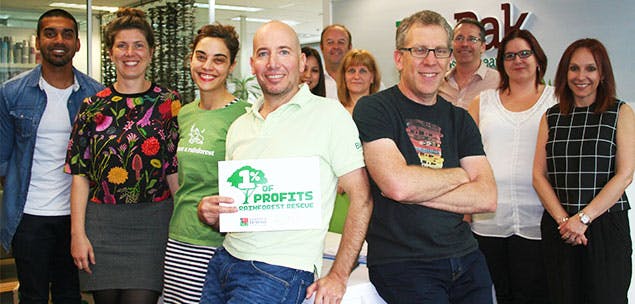For organisations, the decision to ‘go green’ and actively seek ways to conserve the environment goes beyond the warm, fuzzy feeling of being a good corporate citizen – it also makes good business sense. Just ask Richard Fine, founder of BioPak.
Hailing from South Africa, Richard worked in his family’s plastic packaging business for 15 years before relocating to Australia in 2003. Powered by the dream of providing sustainable and rapidly renewable plant-based alternatives to plastic food packaging, Richard started BioPak in 2006.
In the ensuing ten years, the company has not only disrupted the packaging industry’s status quo, it has helped other businesses – and the end consumers – to reduce their environmental footprint.
Now the leading supplier of plant-based, single-use disposable packaging in Australia and New Zealand, the company’s products are certified carbon neutral, rapidly biodegrading so as not to pollute the natural environment.
The triple bottom line
Richard told Dynamic Business that BioPak’s philosophy, from the outset, has been to embrace the ‘triple bottom line’. Also known as the Three Ps (‘People, Planet, Profit’), this business model recognises that economic, social and environmental factors cannot be considered in isolation; rather, as Richard explained, a holistic approach is necessary if a business is to be sustainable.
By striving to foster healthy ecosystems and strong communities, in addition to creating economic value, Richard said BioPak has been able to attract and retain talented employees as well as build a loyal and rapidly growing customer base.
“Through purchasing BioPak products, our customers have been able to offer a point of difference in a crowded and competitive market and appeal to a growing audience of socially and environmentally responsible consumers whilst reducing their environmental impact,” Richard said.
“There are many cheaper alternatives available for businesses whose only concern is profit. Our customers understand that in order for them to build a business or brand with longevity they need to conserve the planet’s natural resources and partner with companies that are able to offer innovative ways for them to reduce their environmental impact. For a business to remain relevant in people’s lives, it has to play a more meaningful role.”
Being sustainable has gained traction
Where BioPak was once the only food packaging company on the scene focusing solely on bioplastic and plant-based packaging, Richard said that increasing consumer awareness has seen the company’s peers adopt plastic alternatives in more recent times.
“Today, consumers understand the impact of their choices and support business that are able to demonstrate that they have a higher purpose other than only financial gain,” he said.
“A big part of our marketing strategy has been educating consumers and business about the environmental impact of single use disposables packaging.”
Measurable environmental benefits
As part of its commitment to delivering social and environmental benefits, BioPak donates 4.5% of its profits to community charities. In addition, Richard said the company’s partnership with non-profit organisation Rainforest Rescue has led to significant, visible and measurable benefits to fauna and flora in the Daintree Rainforest.
“We partnered with Rainforest Rescue in 2011 and produced paper cups that raised awareness and funds for their Save the Cassowary Campaign,” he said.
“The following year we were looking for a way to thank our customers and decided to plant trees on their behalf – Rainforest Rescue was the perfect organisation to assist us with this initiative. Since 2014 we have committed to donating 1% of profits to support the organisation’s efforts to protect and rehabilitate areas of the Daintree Rainforest. To date we have purchased 2 hectares of land and planted 6000 trees. The fact that Rainforest Rescue operates locally was important to us.”
How can your business go green?
The challenges of developing a sustainable business are no different to those faced by other entrepreneurs building other businesses from the ground up, according to Richard.
“Determining the right product for the market was the first challenge,” he said.
“We invested significant effort and financial resources testing and refining different materials before we were able to identify and develop a product range suitable for the local market. The next hurdle was a combination of higher cost and, as a newcomer to the industry, a lack of trust. Through perseverance we have been able to overcome all challenges.”
Richard’s advice to small businesses, including startup founders, is to look at what they can do for society, rather than what society can do for them.
“The traditional way of doing busy is changing, the demand for new products and services that deliver both profit and purpose is growing,” he explained.
“Businesses that are able to provide products or services sustainably will be the corporations of the new millennium. It takes, passion, vision, courage and hard work, the right tools and partners and perseverance.”
Get involved with Rainforest Rescue
If you would like to learn more about Rainforest Rescue, head to www.rainforestrescue.org.au
Dynamic Business invites it readers to join the cause by making donations towards protecting half a hectare of the Daintree. Click here for more details.

